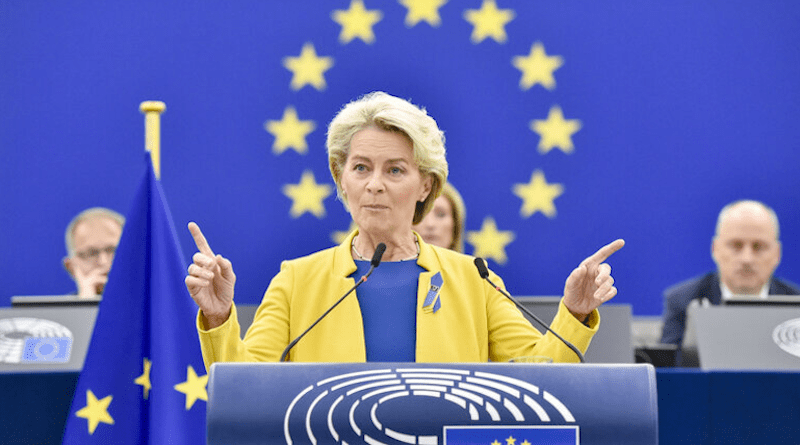Coming Months Critical For EU’s Future Direction – OpEd
By Arab News
By Andrew Hammond*
European Commission President Ursula von der Leyen on Wednesday gave her annual state of the union address amid a crossroads moment for the continent.
Almost three years into her presidency, Brussels faces a tipping point between the possibility of a brighter new dawn versus an array of challenges both new and old, from the Ukraine conflict to the growth of euroskepticism. If fortune favors the EU and its 27 member states, there may now be a window of opportunity for the bloc to build back better.
When Von der Leyen took office in December 2019, there was no way she could have foreseen how her presidency would unfold, with the pandemic being the most decisive challenge of her first two years, before being superseded by Ukraine in 2022. Since Russia’s invasion in February, the EU has faced a first-order crisis that could yet worsen this autumn and winter, despite the gains that Ukraine has made on the battlefield in recent days.
However, as much as this has been a tough environment for Von der Leyen to operate in politically, the history of the European integration project shows that the context of a state of perma-crisis has sometimes been most congenial to enabling political and economic business to progress. Von der Leyen pointed to this when she said, “the unthinkable (major war) has returned to our continent,” and stressed that this would shape the medium to long-term future of the bloc, building from achievements made so far during her presidency.
These include: The EU’s stronger-than-anticipated unity in launching seven rounds of sanctions against Russia since February; the bloc committing to significantly reducing its dependence on Russian fossil fuels; and the fact it may be in the process of transforming itself into a more muscular global actor. The last of these has long been a pet project of Von der Leyen, who has emphasized how much the Ukraine conflict is “fundamentally challenging” Europe’s peace architecture.
What began seven decades ago as a trade bloc binding former warring nations together is today an economic heavyweight with strong potential in broader foreign affairs. And it may have crossed a Rubicon in 2022, including financing, for the first time, the purchase of lethal weapons for a third-party country (Ukraine) and imposing such unprecedented sanctions on Russia.
Another example of the possibly transformative context the EU now finds itself in is the breakthrough Von der Leyen helped forge last year in persuading member states to agree to give the bloc, for the first time in its history, debt-raising powers to finance a €750 billion ($748 billion) post-coronavirus recovery plan. For some, that showed that Europe may be moving much more decisively toward fiscal federalism, not just ever closer political union.
In her big speech on Wednesday — perhaps the most important of her career to date — the former German defense minister outlined her vision for the post-pandemic EU, including energy market reform as a result of the Ukraine war. In essence, this vision builds from the manifesto for economic recovery she is championing, including through the EU’s “Green New Deal.”
Von der Leyen believes it is critical for the bloc of more than 400 million people to be ambitious and seize the initiative in the coming years, as “standing still is falling back.” This is because, as well as opportunities on the horizon, there is also a gathering storm, with the growth of domestic and external challenges that may be without precedent in the postwar era.
On the domestic front, there has been a significant rise in anti-EU, nationalist sentiment across the continent, which has seen populist and far-right arguments coming to the fore, as well as the perceived erosion of the fundamental values of liberal democracy. While Brexit exemplifies this, the problem is by no means limited to the UK. Indeed, Emmanuel Macron admitted in 2018 that even France, one of the two traditional motors of EU integration alongside Germany, would probably have voted to leave the EU if presented with a similar choice to the UK’s 2016 referendum.
On the international front, there is also a new geopolitical reality, which features not just an increasingly assertive Russia, but also China and instability in the Middle East that has driven the migration problems impacting Europe. There is also the uncertainty in transatlantic ties, with some across the continent fearing the significant possibility that Donald Trump may again run for the US presidency in 2024.
Von der Leyen’s speech therefore made clear that the decisions taken in the next few months will help define the EU’s longer-term political and economic character in the face of multiple challenges and opportunities. She is right to argue that now is the time for the bloc to forge a new, stronger path into the mid-2020s and beyond.
• Andrew Hammond is an Associate at LSE IDEAS at the London School of Economics.

